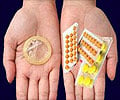The injections contain a long-acting form of progestogen, a hormone that has the effect of blocking sperm production controlled by the pituitary gland.

‘Using long-acting injectable forms of progesterone and testosterone hormones the production of sperms were brought down to a remarkable degree.’





Nearly 300 men were given injections every two months, which reduced sperm count to one million per millilitre or fewer within 24 weeks. At the end of the trial, three-quarters of the men said they would be willing to continue using the contraceptive jab. Dr Mario Festin, from the World Health Organisation in Geneva, Switzerland, said: "The study found it is possible to have a hormonal contraceptive for men that reduces the risk of unplanned pregnancies in the partners of men who use it.
However, researchers said more work was needed to address the treatment's reported side effects, which included depression and other mood disorders, muscle pain and acne. However it did also increase libido.
Prof Allan Pacey at the University of Sheffield said: “There is certainly an unmet need for an effective reversible contraceptive for men, along the lines of the hormonal contraceptive for women." However, none of the preparations that have been developed and tested to date have managed to become a commercial reality for one reason or another.
“In this latest study, the authors used a combination of hormones (progesterone and testosterone) to try and take the science forward. Using long-acting injectable forms of these hormones they were able to suppress the production of sperm to a remarkable degree. As such, this contraceptive was extremely effective and therefore certainly has promise.
Advertisement
Source-Medindia












